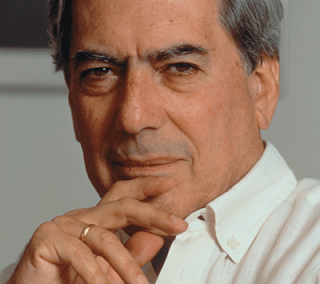Mario Vargas Llosa - Penerima Hadiah Nobel Kesusasteraan 2010
Jorge Mario Pedro Vargas Llosa (Spanish pronunciation: [ˈmaɾjo ˈβarɣaz ˈʎosa]) (born March 28, 1936) is a Peruvian writer, politician, journalist, essayist and Nobel Prize laureate. Vargas Llosa is one of Latin America's most significant novelists and essayists, and one of the leading authors of his generation. Some critics consider him to have had a larger international impact and worldwide audience than any other writer of the Latin American Boom.[1] He was awarded the 2010 Nobel Prize in Literature "for his cartography of structures of power and his trenchant images of the individual's resistance, revolt, and defeat".[2]
Vargas Llosa rose to fame in the 1960s with novels such as The Time of the Hero (La ciudad y los perros, literally The City and the Dogs, 1963/1966[3]), The Green House (La casa verde, 1965/1968), and the monumental Conversation in the Cathedral (Conversación en la catedral, 1969/1975). He continues to write prolifically across an array of literary genres, including literary criticism and journalism. His novels include comedies, murder mysteries, historical novels, and political thrillers. Several, such as Captain Pantoja and the Special Service (1973/1978) and Aunt Julia and the Scriptwriter (1977/1982), have been adapted as feature films.
Many of Vargas Llosa's works are influenced by the writer's perception of Peruvian society and his own experiences as a native Peruvian. Increasingly, however, he has expanded his range, and tackled themes that arise from other parts of the world. Another change over the course of his career has been a shift from a style and approach associated with literary modernism, to a sometimes playful postmodernism.
Like many Latin American authors, Vargas Llosa has been politically active throughout his career; over the course of his life, he has gradually moved from the political left towards the right. While he initially supported the Cuban revolutionary government of Fidel Castro, Vargas Llosa later became disenchanted. He ran for the Peruvian presidency in 1990 with the center-right Frente Democrático (FREDEMO) coalition, advocating neoliberal reforms. He has subsequently supported moderate conservative candidates.
Sumber tulisan dari sini.
Sumber gambar dari sini.


Ulasan